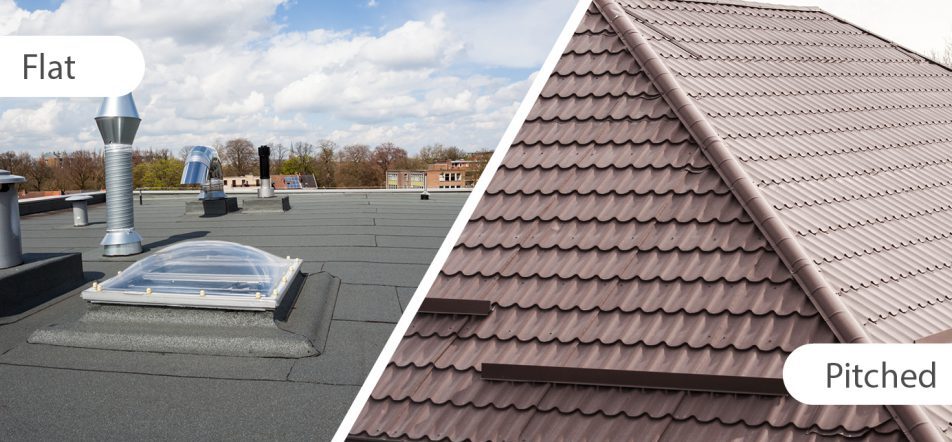When it comes to selecting the right roofing system for your project, one of the primary decisions you'll face is whether to go with a flat roof or a pitched roof so always contact a professional roofer to help with the best choice. Both options have their own unique differences and advantages. In this article, we will compare flat roofs and pitched roofs to help you determine which is the best choice for your specific project.
Flat Roofs: Modern Aesthetics and Functionality
Flat roofs have gained popularity in modern architecture due to their simple and modern appearance. However, the benefits of flat roofs go beyond aesthetics. Let's explore the advantages and considerations of flat roofs:
Advantages of Flat Roofs
- Cost-Effective: Flat roofs typically require fewer materials and less labor compared to pitched roofs, making them a cost-effective option for construction or renovation projects.
- Versatility: Flat roofs offer versatility in design and usage. They provide additional usable space, allowing for rooftop gardens, outdoor seating areas, or even solar panel installations.
- Easy Maintenance: Flat roofs are easier to access and maintain. Cleaning gutters, performing inspections, and making repairs are more convenient compared to pitched roofs.
- Energy Efficiency: Flat roofs provide an opportunity for improved energy efficiency. They can accommodate insulation materials effectively, reducing heat transfer and lowering energy consumption for heating and cooling purposes.
Considerations for Flat Roofs
- Drainage: Flat roofs lack the natural slope of pitched roofs, which can lead to water pooling if proper drainage systems are not in place. Adequate slope, gutters, and drains should be installed to ensure efficient water runoff.
- Weather Vulnerability: Flat roofs may be more susceptible to weather damage, particularly in areas with heavy snowfall or frequent rainfall. The absence of a steep slope can allow water to accumulate, increasing the risk of leaks or structural issues if not addressed promptly.
- Maintenance Requirements: While maintenance is generally easier on flat roofs, regular inspections are crucial to identify and address any potential issues, such as leaks or membrane deterioration.
Pitched Roofs: Classic Appeal and Added Protection
Pitched roofs have long been the traditional choice for residential and commercial buildings. Their distinctive sloping design offers several advantages and considerations that make them a popular option:
Advantages of Pitched Roofs
- Water Drainage: The primary advantage of pitched roofs is their natural ability to shed water efficiently. The sloping angle allows rain, snow, and debris to easily slide off the roof, minimizing the risk of leaks and water damage.
- Durability: Pitched roofs are known for their durability and ability to withstand various weather conditions. Their steep slope enhances resistance against high winds, snow accumulation, and heavy rainfall.
- Classic Appeal: Pitched roofs have a timeless aesthetic appeal that adds charm and character to any building. They are often associated with traditional architectural styles and can enhance the overall visual appeal of a property.
- Attic Space: The sloped design of pitched roofs creates an attic or loft space, offering additional storage or living area potential.
Considerations for Pitched Roofs
- Increased Cost: Pitched roofs generally require more materials and labor during construction compared to flat roofs, which can result in higher upfront costs.
- Limited Usable Space: The sloping design of pitched roofs limits the amount of usable space on the top of the building. Rooftop installations or amenities may not be as easily accommodated as on flat roofs.
- Maintenance Challenges: The steep slope of pitched roofs can make maintenance tasks more challenging. Cleaning gutters, inspecting for damage, and making repairs may require specialized equipment or professional assistance.
- Aesthetics: While the classic appeal of pitched roofs is often considered an advantage, it may not align with the desired aesthetic for certain modern or contemporary architectural styles.
Determining The Right Roofing System For Your Project
To determine which roofing system is right for your project, consider the following factors:
- Architectural Style: Consider the overall architectural style and design intent of your project. Flat roofs tend to complement modern and minimalist aesthetics, while pitched roofs are well-suited for traditional or classic styles.
- Climate and Weather Conditions: Evaluate the climate and weather patterns in your area. If heavy rainfall, snow, or strong winds are common, a pitched roof may provide better protection against weather-related issues.
- Usage and Space Requirements: Consider how the roof will be utilized and if additional usable space is needed. Flat roofs offer more versatility for rooftop installations or outdoor areas, while pitched roofs provide attic or loft space.
- Budget Considerations: Assess your budget and consider the cost implications of each roofing system. Flat roofs generally have lower upfront costs, but long-term maintenance requirements should also be considered.
- Maintenance and Accessibility: Evaluate your ability to perform regular maintenance and inspections. Flat roofs are generally easier to access and maintain, but pitched roofs may require more frequent and specialized attention.
- Energy Efficiency: Consider the energy efficiency goals for your project. Both roofing systems can accommodate insulation, but flat roofs offer greater potential for improved energy efficiency due to increased insulation options.
- Local Building Regulations: Ensure compliance with local building codes and regulations, as they may dictate specific requirements for roof slope, materials, or drainage systems.
Conclusion
Choosing between a flat roof and a pitched roof depends on several factors, including architectural style, climate, budget, and intended usage. Flat roofs offer modern aesthetics, cost-effectiveness, and versatility, but require attention to proper drainage and maintenance.
Pitched roofs provide classic appeal, enhanced water drainage, and durability against various weather conditions, but come with higher upfront costs and maintenance challenges. It is essential to carefully evaluate your project's specific needs and consult with roofing professionals to determine the best roofing system.
If you're not certain of which roof to choose, contact our team of professional roofing contractors at 1274 5th Ave New York, NY 10029 (212) 457-1324 https://bestroofingnyc.com to help you make the right decision.
